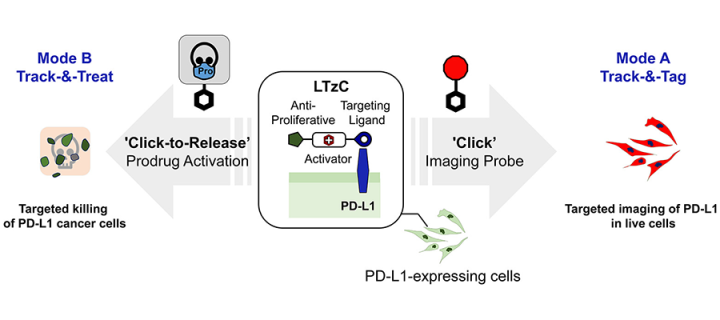New strategy to target cancer cells expressing PD-L1
Edinburgh researchers report a ligand-tetrazine conjugate approach to “track & treat” malignant cells that are capable of evading the immune system: August 2022

Programmed death ligand 1 (PD-L1) is a protein that can act as a kind of “brake” to keep the body’s immune responses under control. It is present on some normal cells and in higher-than-normal amounts on some cancer cells. When PD-L1 binds to another protein called PD-1 (a protein found on T cells – a type of white blood cells that are an essential part of the immune system), it keeps T cells from killing the PD-L1-containing cells, including the cancer cells. In such “immunosuppressed” environment tumour cells can thrive, which often results in more aggressive cancer growth and spread.
Discovery of the role of PD-L1 in “immunosuppression” paved the way to development of anticancer drugs (called immune checkpoint inhibitors) that bind to PD-L1 and block its binding to PD-1. This releases the “brakes” on the immune system and leaves T cells free to kill cancer cells. Targeting immune checkpoints with monoclonal antibodies has revolutionised the treatment of several difficult-to-treat cancers (e.g. urothelial carcinoma, non-small cell lung cancer, triple-negative breast cancer, small cell lung cancer and hepatocellular carcinoma). There was also significant progress in synthesis of small molecule inhibitors of PD-L1. Nonetheless, currently available PD-L1 therapeutics (in most cases) are insufficient to eradicate tumours in patients with advanced cancer. Many scientist believe that better understanding of PD-L1 biology and additional improvements to current approaches targeting PD-L1 expressing cancer cells might provide new windows of opportunity for development of even better therapeutics.
In a recent study titled “Targeted Molecular Construct for Bioorthogonal Theranostics of PD-L1-Expressing Cancer Cells”, Dr Shiao Chow and Professor Asier Unciti-Broceta - Edinburgh Cancer Research investigators at the Institute of Genetics and Cancer – created a ligand-tetrazine conjugate (LTzC) armed with a PD-L1 small molecule inhibitor BMS-202 to selectively target PD-L1 expressing cancer cells. The tetrazine moiety in the construct enabled it, under physiological conditions, to pair with certain type of specially designed molecules in a chemical reaction known as IEDDA cycloaddition (a type of so called “click-reaction”). Using breast cancer cells as a model system and the “click-reaction” approach with appropriately designed fluorescent dye, they demonstrated that LTzC is able to promote internalization and subsequent degradation of PD-L1 molecules. They were also able to employ LTzC and its “click-reaction” capability to selectively kill cancer cells expressing PD-L1 by attracting and activating specially designed forms of other anticancer drugs like mTOR inhibitor sapanisertib and the cytotoxic agent doxorubicin. The study opens exciting new opportunities in targeting PD-L1 on tumour cells. Utilizing LTzC as a PD-L1 imaging probe might prove to be a valuable tool to gain additional insights into PD-L1 biology.
The work was published in JACS Au, a journal of the American Chemical Society. It was supported by funding from the European Commission and the Engineering and Physical Sciences Research Council (with some additional support from the Wellcome Trust iTPA Springboard Award).
Our work represents the first use of PD-L1 small molecule inhibitors as selective cancer cell-targeting ligands to deliver functional cargoes. We hope that it might lead to development of novel therapeutic strategies to eradicate PD-L1 expressing cancer cells. It also provides new tools for future studies to better understand PD-L1 biology in cancer cells.
Related Links
Article in JACS Au: https://pubs.acs.org/doi/10.1021/jacsau.2c00328
Innovative Therapeutics Group web page: https://www.ed.ac.uk/cancer-centre/research/unciti-broceta-group
Tumor Microenvironment and PD-L1 biomarker – interesting video from Roche: https://www.youtube.com/watch?v=tdslSK9HLp8
PD-1/PD-L1 pathway: current researches in cancer – an interesting review article: https://www.ncbi.nlm.nih.gov/pmc/articles/PMC7136921/
Related Stories
- Cancer drug precursor designed to reduce toxic side effects
- Controlled drug release in the brain
- Licensing of a SRC/YES1 inhibitor with novel mode of action
- Synthesis of palladium activated analogue of anticancer drug irinotecan
- Palladium mediated catalysis works in preclinical mouse model
- Development of new inhibitors of oncogenic receptor tyrosine kinases
- Killing cancer cells using palladium nanoparticles
- Gold-Triggered Uncaging Chemistry in Living Systems Opens New Frontiers for Cancer Therapy

